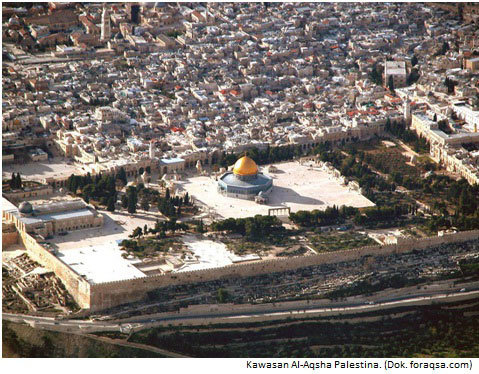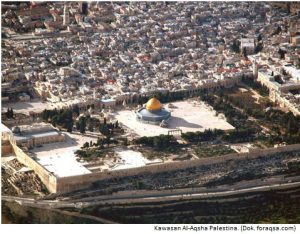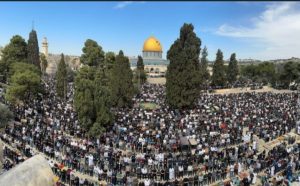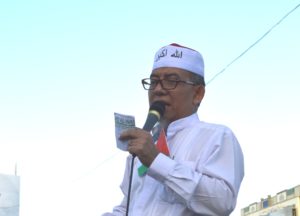By Imaam Yakhsyallah Mansur
بِسْمِ اللَّهِ الرَّحْمَنِ الرَّحِيم
Allah Subhanahu wa Ta’ala says:
قَالَ رَبِّ اغْفِرْ لِيْ وَهَبْ لِيْ مُلْكًا لَّا يَنْۢبَغِيْ لِاَحَدٍ مِّنْۢ بَعْدِيْۚ اِنَّكَ اَنْتَ الْوَهَّابُ ٣٥(النمل [٢٧]: ٣٥)
Also Read: Imaam Yakhsyallah Mansur: Surah At-Tin Indicates the Command to Liberate Al-Aqsa
“He (Sulaiman) said, ‘My Lord, forgive me and grant me a kingdom that will not belong to anyone after me. Truly, You are the Bestower.’” (QS. An-Naml [27]: 35)
Imam Ibn Kathir Rahimahullah explains that the supplication of Prophet Sulaiman Alaihis salam reflects a balance between seeking forgiveness and requesting authority. He did not merely desire a kingdom, but first acknowledged the importance of divine forgiveness and purity of heart.
The phrase وَهَبْ لِي مُلْكًا (grant me a kingdom) emphasizes that every success, position and authority is a divine gift, not solely the result of human capability. Prophet Sulaiman Alaihis salam understood that without Allah’s pleasure, even the greatest kingdom would not bring benefit.
Prof. Yusuf Al-Qaradawi highlights the ethical dimension of leadership in this prayer, noting that authority must be accompanied by moral and spiritual responsibility. Sulaiman did not request a kingdom for personal enjoyment, but for the extraordinary responsibility of leading humans, jinn, animals, the wind and more.
Also Read: Imaam Yakhsyallah: Nurture Love for the Prophet, One Will Be with Whom One Loves
From the perspective of tasawuf, this verse underscores the balance between worldly life and the hereafter. Sufi scholars note that asking for forgiveness before asking for power symbolizes inner purity.
Imam Al-Ghazali Rahimahullah emphasizes that a servant who balances supplications for forgiveness and worldly needs is wise. Prophet Sulaiman Alaihis salam exemplified sincerity of intention even while ruling a vast empire.
The verse also emphasizes Allah’s attribute as Al-Wahhab (The Supreme Giver). Prophet Sulaiman Alaihis salam recognized that power, knowledge and extraordinary abilities were gifts from Allah Ta’ala alone.
The prayer of Sulaiman serves as a model for Muslims seeking blessings in this world and the next, with forgiveness and the pleasure of Allah as the ultimate goals. Prophet Sulaiman governed with justice and complete submission to Allah’s law.
Also Read: Friday Sermon: Emulating the Firmness of the Prophet in Struggle
The Kingdom of Prophet Sulaiman Alaihi Salam
The empire of Prophet Sulaiman Alaihis salam extended from Sham (Palestine) to the valleys of Yemen, including the kingdom of Saba’ ruled by Queen Bilqis. His influence crossed nations and regions.
He ruled not only humans, but also jinn, animals and even the wind. This extraordinary power was not for pride, but for serving humanity and upholding Allah’s law.
His authority encompassed both physical and spiritual power. He understood the language of animals, organized the jinn for construction tasks and commanded the wind to transport him across lands.
See Also: The Two-State Solution (Palestine–Israel) from a Historical Perspective
Also Read: Imaam Yakhsyallah: Muslims Unity as Key to Victory of Islam
Imam Ibn Kathir Rahimahullah narrates a hadith from Abu Hurairah Radhiallahu anhu regarding Sulaiman’s unique prayer:
“إِنَّ عِفْرِيتًا مِنَ الْجِنِّ تَفَلَّتَ عَلَيَّ الْبَارِحَةَ، لِيَقْطَعَ عَلَيَّ صَلَاتِي، فَأَمْكَنَنِيَ اللَّهُ مِنْهُ، فَأَرَدْتُ أَنْ أَرْبِطَهُ إِلَى سَارِيَةٍ مِنْ سَوَارِي الْمَسْجِدِ، حَتَّى تَصْبِحُوا فَتَنْظُرُوا إِلَيْهِ كُلُّكُمْ، فَذَكَرْتُ دُعَاءَ أَخِي سُلَيْمَانَ: (رَبِّ هَبْ لِي مُلْكًا لَا يَنْبَغِي لِأَحَدٍ مِنْ بَعْدِي) فَرَدَدْتُهُ خَاسِئًا.” (متفق عليه)
This hadith recounts how an ifrit attempted to disrupt the Prophet Muhammad’s prayer, but he released it after recalling Sulaiman’s prayer.
Imam Fakhruddin ar-Razi Rahimahullah states that the vast authority of Sulaiman demonstrates Allah’s power to subjugate elements of the universe for His obedient servants.
Also Read: Friday Sermon: Prophet Muhammad Is Not a Political Figure
This authority was not personal strength, but a manifestation of Allah’s might. The kingdom of Sulaiman became a sign of divine power granted to a knowledgeable and faithful servant.
Prof. Wahbah Az-Zuhaili comments that Sulaiman’s governance is an early model of good governance in the perspective of revelation. Justice was upheld, development continued and public welfare was prioritized. His immense power only increased his humility before Allah.
Scholars also highlight his wisdom-based leadership, which extended even to small creatures like ants and birds.
The story of Prophet Sulaiman Alaihis salam serves as a model of prophetic leadership, balancing faith, knowledge and power. He led with love instead of ambition, wisdom instead of desire, and authority served only as a means to uphold truth.
Also Read: Without Knowledge, Congregation Is Merely a Crowd Without Direction
The Islam of Queen Bilqis
One of the most remarkable events of Sulaiman’s reign was his encounter with Queen Bilqis of Saba’. It began when the hoopoe bird brought news of a prosperous kingdom ruled by a woman whose people worshipped the sun. The story is recorded in Surah An-Naml [27]: 20–44.
Prophet Sulaiman guided her to Islam not through war, but through wisdom, miracles and faith.
It was a conquest without war, a victory without bloodshed. Sulaiman won hearts before territories.
Imam Al-Qurtubi states that Sulaiman sent a letter filled with wisdom, calling Bilqis to monotheism. He then invited her gently, demonstrating divine miracles and the strength of his knowledge without arrogance.
Also Read: Friday Sermon: Grateful for Indonesia’s Independence by Supporting Palestine’s Freedom
Historians such as Al-Tsa‘labi and Al-Mas‘udi recorded extraordinary technological advancement during Sulaiman’s reign. He commanded jinn to build grand palaces, jewel-adorned thrones and glass pathways.
He used the wind for transportation, which today may resemble the concept of harnessed energy or aerodynamics.
Bilqis was astonished by the sophistication and order of Sulaiman’s kingdom. Dr. Wahbah Az-Zuhaili described her conversion as the triumph of knowledge over ignorance.
The peak of Sulaiman’s greatness was not his miracles but his spiritual wisdom. He invited Bilqis not to expand power or exploit Saba’, but to recognize Allah.
Also Read: The Bestial Nature of Netanyahu
See Also: When the Sumud Flotilla Failed to Reach Gaza
Prophet Sulaiman Was Not a Sorcerer
The Jews accused Prophet Sulaiman Alaihis salam of practicing magic after his death. Such an accusation is unbefitting for any prophet of Allah.
Allah Subhanahu wa Ta’ala refutes this in the Qur’an:
…،وَمَا كَفَرَ سُلَيْمَانُ وَلَٰكِنَّ الشَّيَاطِينَ كَفَرُوا يُعَلِّمُونَ النَّاسَ السِّحْرَ… (البقرة [٢]: ١٠٢)
Also Read: Why A Mother’s Literacy Matters: Lessons from Rose Kennedy
See Also: Beware the Parasites of Bani Israil within the Muslim Community
Ibn Kathir and Al-Qurtubi explain that this lie originated from Jews influenced by devils. They wrote magical texts and falsely attributed them to Sulaiman. He never taught sorcery, and even burned such writings.
At-Thabari recounts that devils hid scrolls beneath Sulaiman’s throne. After his death, they claimed his power came from sorcery. Allah revealed verses to restore the honor of His prophet.
Contemporary scholars like Shaykh As-Sa‘di explain that the accusation stems from envy of revelation. Ibnul Qayyim states that magic and miracles differ fundamentally; magic arises from shirk and deception, while miracles come from faith and obedience.
Also Read: Friday Sermon: Strengthening Islamic Brotherhood in Defense of Palestinian Muslims
Accusing Sulaiman of sorcery mixes light with darkness and is a form of disbelief in prophetic teachings.
The Temple of Solomon: Origins and Reality
Another accusation claims that Sulaiman built the Temple of Solomon (Haikal Sulaiman). This narrative is used by modern Zionists to justify their claims over Baitul Maqdis and Al-Aqsa.
Historical sources show that Prophet Sulaiman did not build a Jewish temple, but rebuilt Baitul Maqdis, a sanctuary for worshiping Allah alone.
Even Jewish archaeologists such as Israel Finkelstein and Neil Silberman state that there is no archaeological evidence supporting the existence of such a structure.
Kathleen Kenyon likewise concluded that archaeological evidence for such a temple is extremely minimal.
Islamic historian Raghib As-Sirjani states that the “Temple of Solomon” narrative is a political strategy aimed at erasing Islamic history in Palestine.[]
والله أعلمُ بالـصـواب
Mi’raj News Agency (MINA)




































 Mina Indonesia
Mina Indonesia Mina Arabic
Mina Arabic